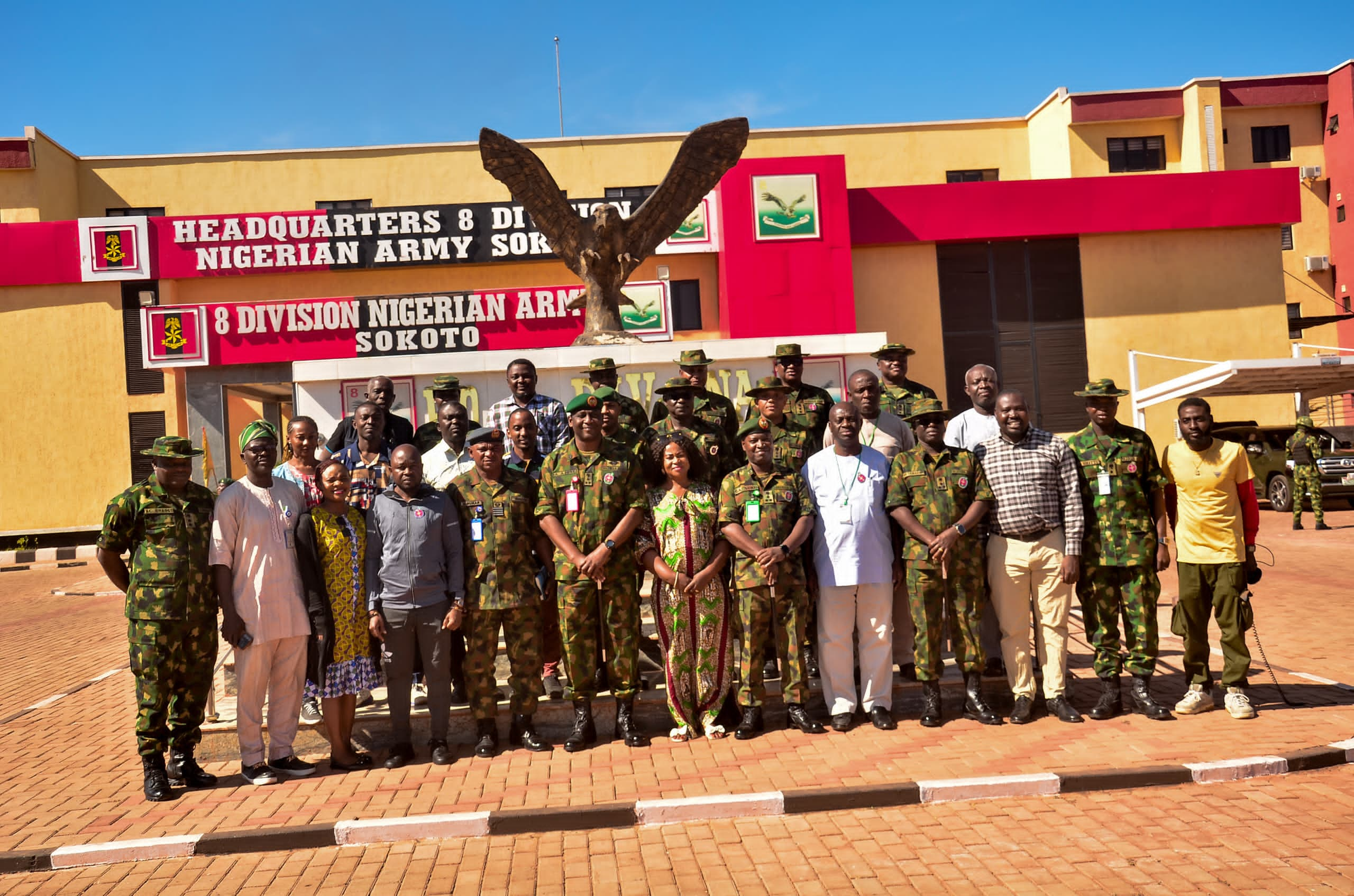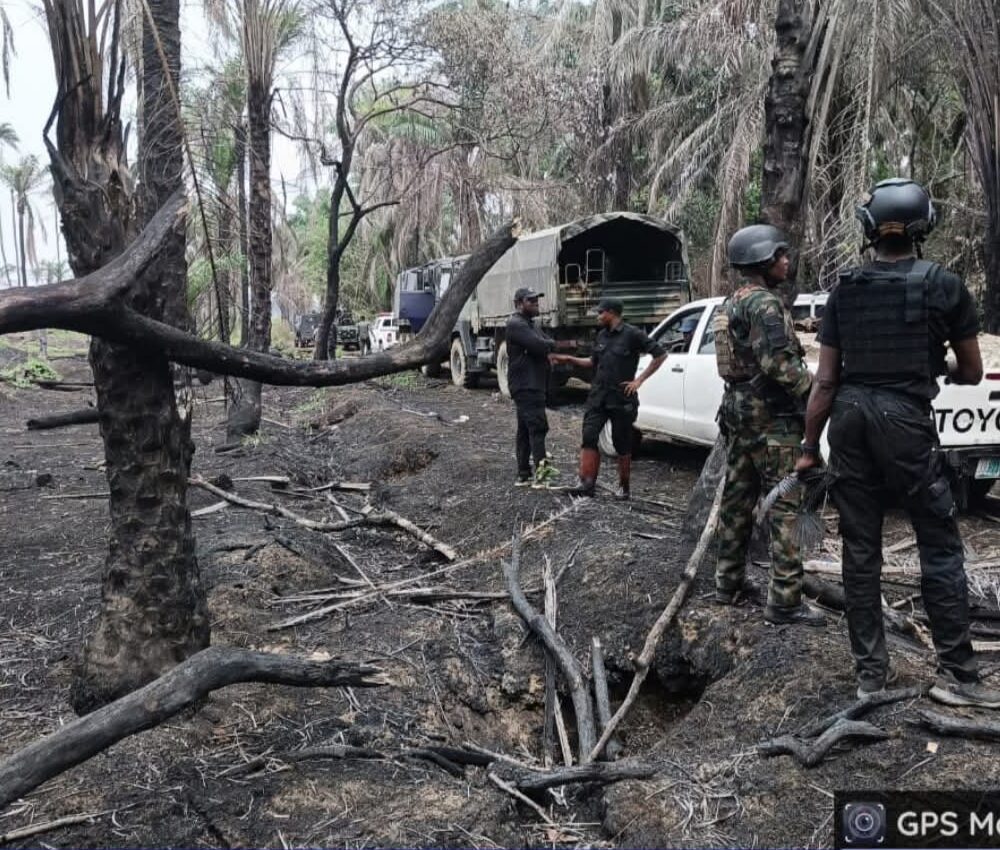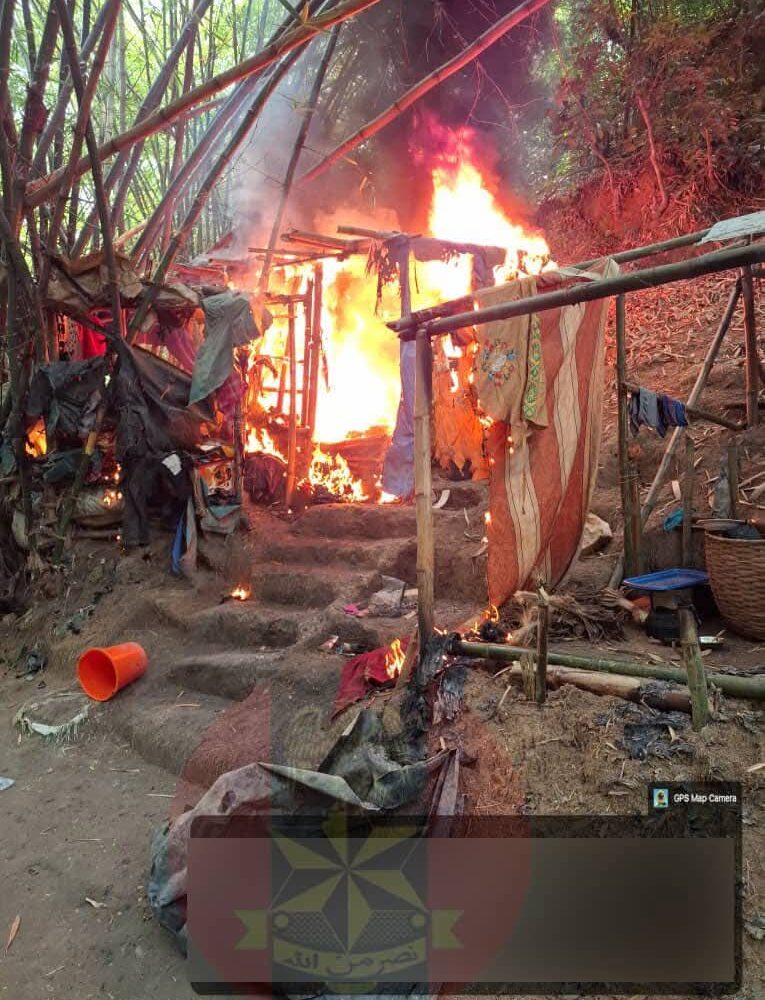In a region fraught with the threats of terrorism, banditry, and insurgency, the Nigerian military’s Operation Fasan Yamma(OPFY) has become a cornerstone in the fight to restore peace and security to the North-Western states. Launched in October 2024, the operation which comprises of Troops from Nigerian military, DSS, Nigerian Police, NSCDC and Local vigilante groups, main focus has been the eradication of the Lakurawa insurgent group, which had significantly destabilized parts of Zamfara, Katsina, and Sokoto States. These states are not only hotspots for criminal activity but also sit on Nigeria’s porous borders with Niger Republic, presenting a unique security challenge.
A team of Defence Correspondents, led by Group Captain I.A. Bukar of Defence Headquarters, Abuja recently visited the North West Nigeria in December 2024 for an on-the-ground assessment of the ongoing military operations. Over the course of four days, the team traveled across communities in Zamfara, Katsina, and Sokoto states, including areas close to the Nigeria-Niger Republic border, engaging with military commanders, local leaders, and residents.
The team was received at the Operation Fasan Yamma Headquarters in Gusau, Zamfara State, by Brigadier General N.N. Orok, who represented the Theatre Commander, Major General Soyele.
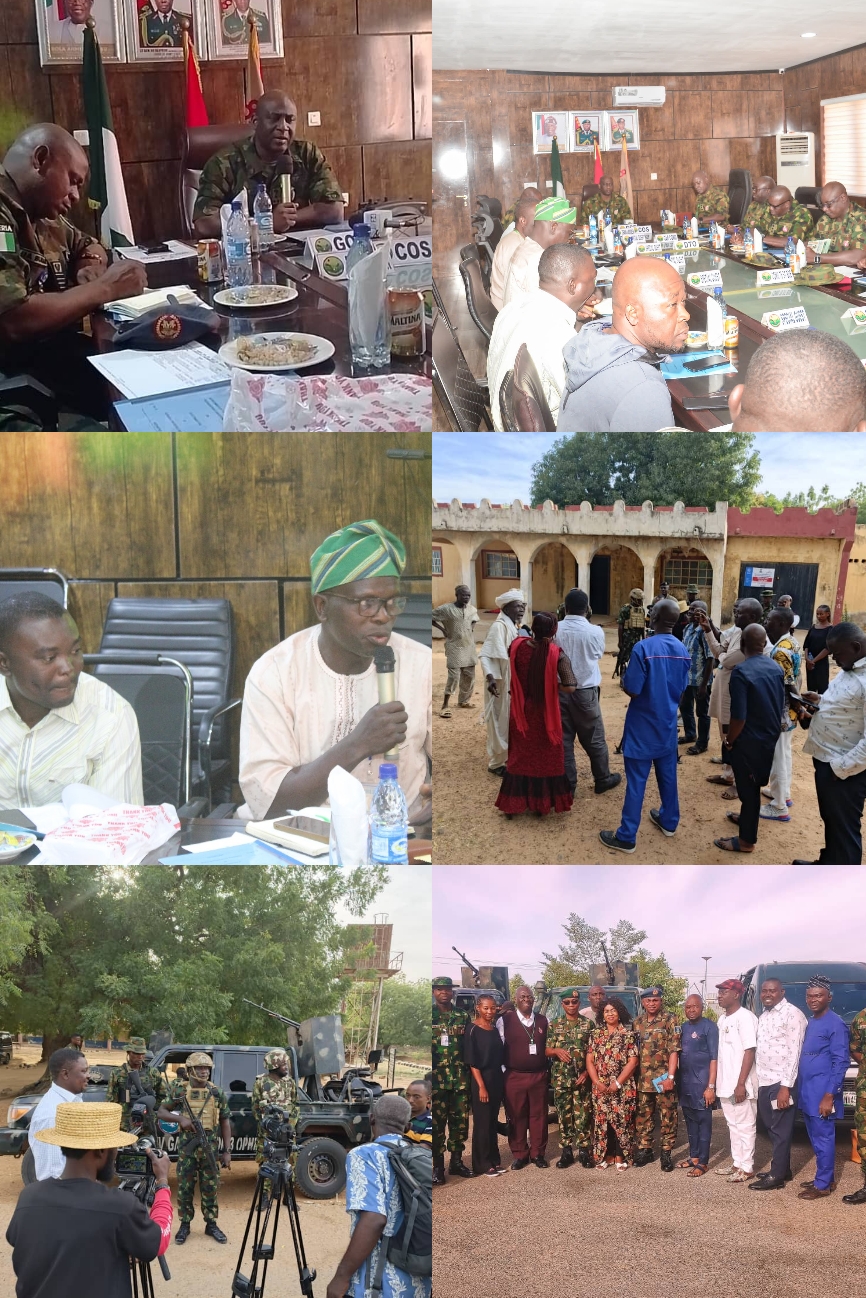
Brigadier General Orok shared impressive details of the operation’s progress, revealing that the military had neutralized 222 terrorists, rescued 608 kidnapped victims, and recovered over 4,400 rustled livestock. The operations have also disrupted terrorist hideouts and supply chains, resulting in the capture of key figures linked to notorious bandit leaders such as Sani Black and Gwaska Dankarin.
Brigadier General Orok emphasized that the operations, which span six states—Kebbi, Sokoto, Zamfara, Katsina, Kaduna, and Niger—are critical to addressing banditry, cattle rustling, and kidnappings. The operation also targets the Islamic State in the Greater Sahel (ISGS), also known as Lakurawa, which has sought to exploit the region’s instability. The Theatre Commander’s representative noted that the military’s coordinated ground and air offensives had significantly weakened insurgent networks.
The Defence Correspondents also received briefings from Brigadier General Timothy M. Opurum, Brigade Commander of 1 Brigade Gusau, and Brigadier General B.O. Omopariola, Brigade Commander of 17 Brigade Katsina.
Brigadier General Opurum highlighted the importance of continued community cooperation for maintaining security and ensuring that local populations benefit from the peace efforts. Brigadier General Omopariola outlined strategies to further bolster security along the border areas, emphasizing intelligence gathering and proactive engagements with local leaders.
Interviews with Key Military Commanders
During the visit, the Defence Correspondents team met with key military commanders overseeing Operation Fasan Yamma.
Brigadier General NN Orok, Chief of Staff to Theatre Commander Major General Soyele, welcomed the Defence Correspondents to Gusau on behalf of Major General Soyele, the Theatre Commander. He spoke about the successes of Operation Fasan Yamma, which involves collaboration among several security agencies, including the Nigerian Army, DSS, NSCDC, and the Nigeria Police Force. “The joint efforts of these agencies have been essential in neutralizing the threat posed by the Lakurawa group. We are working with one purpose: to restore peace and security to the North-West,” Brigadier General Orok stated.
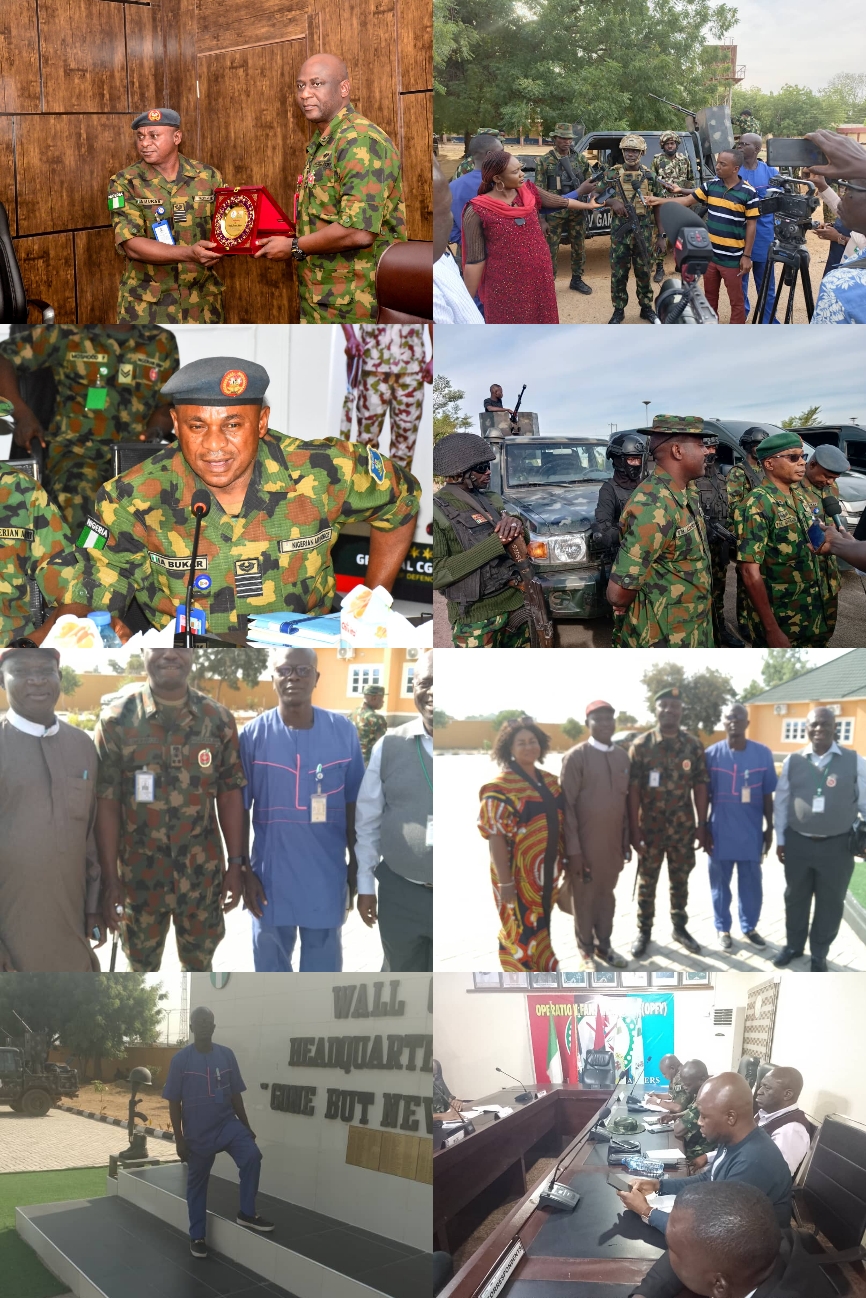
Brigadier General Timothy M. Opurum, Brigade Commander 1 Brigade Gusau, further added, “The security situation is improving, but we are not complacent. We continue to monitor the situation closely, and with the support of the local population, we are making significant strides in neutralizing the insurgents.”
Brigadier General B.O. Omopariola, Brigade Commander 17 Brigade Katsina, also briefed the Defence Correspondents, highlighting the collaborative efforts with other security agencies. He acknowledged the complex security challenges but reassured the public that the military was committed to securing the region.
The Emergence of Lakurawa Group and the Impact on Local Communities
The Lakurawa group, initially seen as a local militia group that helped expel previous insurgent factions, has now become a major threat to regional security. These insurgents, whose activities spread from Zamfara into the bordering areas of Sokoto and Katsina, have terrorized local populations, especially in Sama village, located near the Nigeria-Niger border.
Malam Shehu Mohammed, Wakilin Sultan Sokoto and the District Head of Masallachi Gongonu—a town bordering Niger Republic—recounted how the Lakurawa group once gained the support of local communities.
“We gave our daughters to the Lakurawa men in marriage because they were initially seen as protectors of our communities. But they have now become the very threat we sought to eliminate,” said Malam Shehu, reflecting the change in sentiment that has gripped the region since the group’s transformation into a violent insurgency.
The Lakurawa group’s initial reputation as defenders of the local population has now been overshadowed by their violent activities. This has created a complex situation where former allies have turned into adversaries, complicating efforts for a smooth military intervention.
In a strategy to maintain influence over local communities, the Lakurawa group has sought to win over residents by offering incentives, including money. They have also targeted government and military officials, telling the communities that these officials are their true enemies. The group encouraged the locals not to worry about their threats and instead to provide information on military operations and share with them as partners in crime. Such manipulation has created further challenges for the military’s efforts, as the insurgents’ psychological control over the population undermines cooperation with authorities.
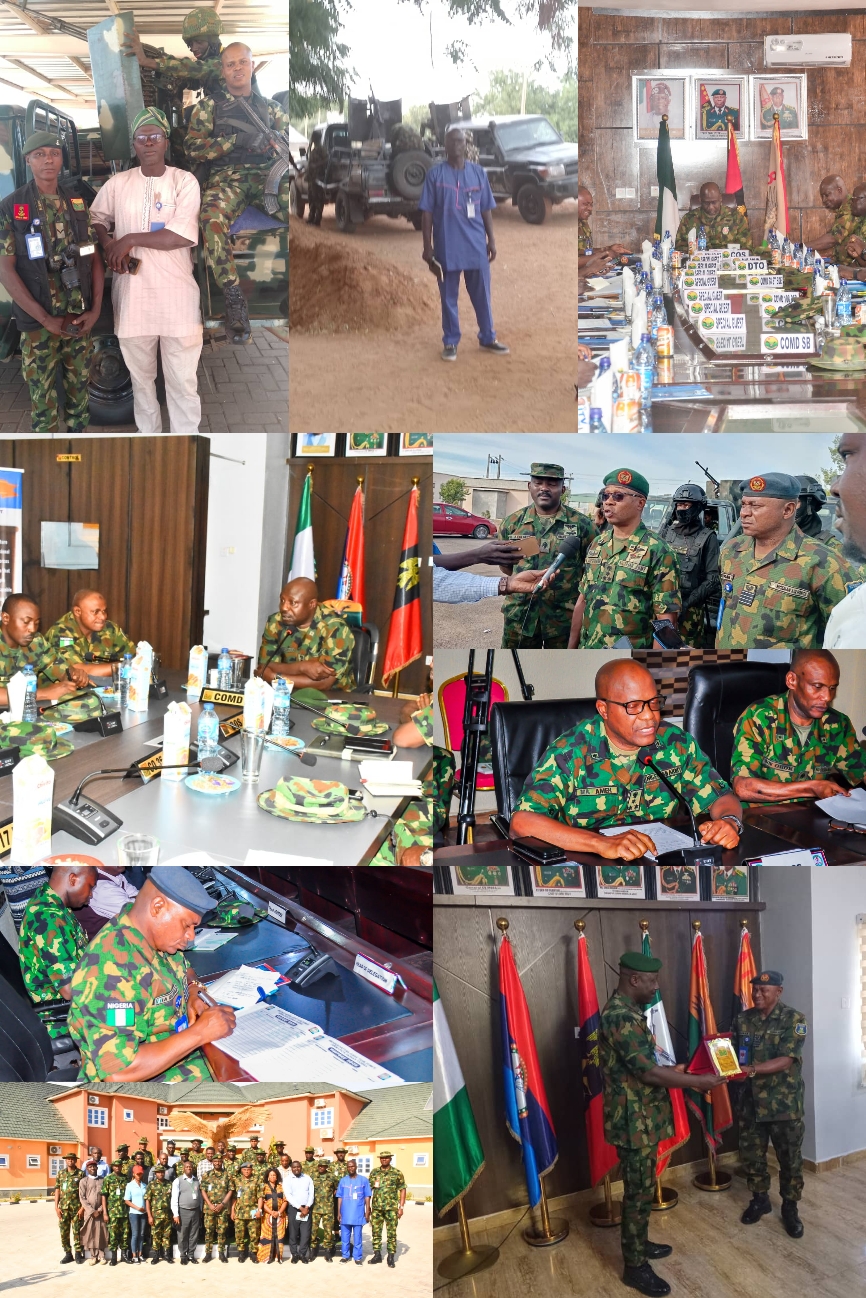
Kinetic and Non-Kinetic Operations in the Region
Operation Fasan Yamma’s approach has been multi-faceted, combining both kinetic and non-kinetic measures to deal with the Lakurawa insurgents. Kinetic operations include direct military strikes on identified insurgent camps, while non-kinetic measures involve engaging local communities and offering them essential services to restore peace and stability.
“The primary objective of Operation Fasan Yamma is to dismantle the Lakurawa group’s strongholds. Since the operation began, we’ve been able to neutralize their camps, forcing them into more isolated locations,” said Captain Martins Maigamu, Commanding Officer at the Forward Operating Base (FOB) Gongonu in Tangaza Local Government, Sokoto State.
The military’s efforts have already seen some success. Key insurgent hideouts have been dismantled, and several high-profile leaders of the Lakurawa group have been captured or killed. However, the task of eliminating the group’s presence completely is still ongoing.
“We are engaged in a continuous battle, and as long as the group remains a threat, we will relentlessly pursue them,” Captain Maigamu added.
Reactions from Farmers and Motorists in the Affected Communities
The impact of Operation Fasan Yamma on local communities has been profound, with residents expressing mixed but largely positive sentiments about the military’s efforts to restore normalcy. Along the Katsina-Gusau road, long considered a hotspot for banditry, both farmers and motorists have noted significant improvements in security.
Abdullahi Musa, a maize farmer in Zamfara, shared how the increased military presence has allowed him to return to his farmland without fear. “Before the military intensified their operations, we could only farm during the day and often under great risk. Now, I can tend to my crops in peace, and the soldiers even patrol nearby to reassure us of safety,” he said.
Another farmer, Malam Sani from Katsina, remarked on how life is gradually returning to normal. “For years, I couldn’t visit my farmlands during the harvest season because of fear of attack or kidnapping. This year, I harvested without incident. The soldiers have done well, but we still need more presence in the interior villages,” he said, urging the military to sustain its momentum.
Motorists who frequently travel on major routes in the region also highlighted the reduced security risks. “Just six months ago, traveling on the Katsina-Gusau road after sunset was unthinkable,” said Suleiman Haruna, a commercial driver who regularly transports goods between the two states. “Now, we see soldiers patrolling, and the checkpoints are more active. It gives us confidence that we can drive without fearing for our lives.”
However, some residents expressed concerns about the lingering threats. Ibrahim Abdullahi, a herder in Sokoto, acknowledged the military’s efforts but noted that occasional attacks still occur in some remote areas. “The situation has improved a lot, but the insurgents sometimes come back at night. We need more sustained patrols and maybe even permanent bases in our villages,” he suggested.
In Sokoto’s Tangaza Local Government Area, close to the Forward Operating Base in Gongonu, the story was similar. Fatima Garba, a food vendor, explained how increased security has revitalized the local economy. “When the attacks were frequent, people couldn’t even visit the market. But now, the soldiers are here, and businesses are picking up. We are grateful, but we pray for this peace to last,” she said.
While many residents applauded the military’s efforts, some also highlighted the challenges posed by insurgents’ psychological manipulation. In several communities, locals described how insurgents threatened them into compliance or spread propaganda against the military. “They told us the soldiers are only here temporarily and that they’ll return stronger when the soldiers leave,” said a farmer in Katsina, who requested anonymity. “We trust the military, but we need them to stay longer to break the insurgents’ influence.”
The Role of Informants and the Need for Public Awareness Campaigns
One of the biggest hurdles for the military in combating the Lakurawa insurgency has been the active role some residents play as informants for the bandits. It has emerged that certain individuals, whether motivated by fear, coercion, or personal gain, have been providing the Lakurawa group with valuable intelligence about military operations and movements. This has not only prolonged the insurgency but also put the lives of those working to restore peace at risk.
“The problem with the Lakurawa group is not just their weapons, but their network of informants in the communities. We must address this if we want to make significant progress,” said Brigadier General Ibikunle Ademola Ajose, General Officer Commanding (GOC) 8 Nigerian Army, Sokoto state.
The situation has highlighted the urgent need for a broad national effort to improve public awareness on the importance of patriotism and community support in the fight against insurgency. To this end, the Nigerian military Authority must consider engaging agencies like the National Orientation Agency (NOA) to educate residents in affected areas about the critical need to stand against insurgent activities and support the military in the fight for peace.
“While community leaders are working closely with the military to help educate the people, we need wider engagement at the national level to promote patriotism and selfless service,” said a Youth Leader in one of the affected communities.
Humanitarian and Development Initiatives in Response to the Crisis
While military actions have been paramount, Operation Fasan Yamma also recognizes the importance of providing humanitarian assistance and addressing the socio-economic challenges exacerbated by the insurgency.
Brigadier General Ibikunle Ademola Ajose, General Officer Commanding (GOC) 8 Division, explained that the military is also committed to enhancing the welfare of affected communities.
“We have provided boreholes and other essential amenities to the communities in the area of operations. These are part of our efforts to win hearts and minds and to restore normalcy in these communities,” Brigadier General Ajose stated.
The provision of clean water, healthcare services, and infrastructural development is seen as a step towards building lasting peace. These initiatives complement the military’s kinetic operations, ensuring that military success is translated into tangible benefits for the local populations
Challenges of Border Security and Local Engagement
One of the key challenges in the fight against the Lakurawa insurgents has been the porous border between Nigeria and Niger. The border areas, often characterized by a lack of strong security presence, allow insurgents to cross freely between countries, complicating military efforts to secure the region.
Another challenge is the deep-rooted cultural and familiarity ties some communities have with the insurgents.
Some of the residents are in-laws to the insurgents .While many have supported the military’s efforts, some locals are reluctant to fully cooperate due to fears of retaliation from insurgents or the cultural and familiarity bonds they share with the groups.
“ Lakurawa told us that military and government officials are their targets and we only need to cooperate with them to attack their targets.
“We need the military to continue engaging with us in ways that build trust. Many of us have been through difficult times in the past, and while we understand the necessity of this operation, it must be done with respect for our people,” community leader Malam Shehu stated.
Looking Ahead: Continuing the Fight and Strengthening Partnerships
As the battle against the Lakurawa group continues, the military remains focused on restoring full security to the North-West region. Plans for future operations, particularly the deployment of Special Forces to dismantle remaining insurgent cells, are already in motion. At the same time, the Nigerian Army is expanding its efforts to engage with local communities, ensuring that long-term peace is built on trust, cooperation, and mutual respect.
“We must continue to work hand in hand with the people,” Captain Maigamu emphasized. “The insurgents have used fear and manipulation to control these communities, but we aim to provide them with safety and hope for the future.”
The fight against the Lakurawa group remains a high priority for the Nigerian military and the communities they serve. The successes recorded so far under Operation Fasan Yamma demonstrate that a well-coordinated approach—combining military action, community engagement, and humanitarian efforts—can yield positive results in combating insurgency.
However, the challenges of securing porous borders, addressing the role of informants, and winning the trust of affected populations require sustained efforts not only from the military but also from government agencies, community leaders, and civil society. The inclusion of agencies like the National Orientation Agency to promote patriotism and educate residents on their roles in nation-building will be instrumental in bridging the gap between security forces and local populations.
As the military continues to strike at the heart of insurgent operations, initiatives like providing boreholes and other social amenities to affected communities serve as a reminder of the importance of fostering hope and resilience in conflict-affected areas. With a clear strategy and the unwavering cooperation of the people, there is optimism that the North-West region can overcome the threats posed by insurgents and move towards a future of peace and development.
*Babalola is a Defence Correspondent and Publisher, Emporium Reporters.He can be reached on,emporiumreporters@gmail.com,
08037469328


